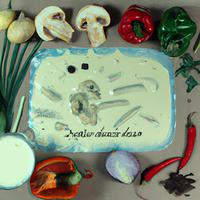
1 serving (200 grams) contains 150 calories, 5.0 grams of protein, 8.0 grams of fat, and 15.0 grams of carbohydrates.

Log this food in SnapCalorie

Nutrition Information
Calories |
176.5 | ||
|---|---|---|---|
% Daily Value* |
|||
| Total Fat | 9.4 g | 12% | |
| Saturated Fat | 4.7 g | 23% | |
| Polyunsaturated Fat | 0 g | ||
| Cholesterol | 11.8 mg | 3% | |
| Sodium | 352.9 mg | 15% | |
| Total Carbohydrates | 17.6 g | 6% | |
| Dietary Fiber | 3.5 g | 12% | |
| Sugars | 4.7 g | ||
| protein | 5.9 g | 11% | |
| Vitamin D | 0 mcg | 0% | |
| Calcium | 176.5 mg | 13% | |
| Iron | 1.8 mg | 10% | |
| Potassium | 411.8 mg | 8% | |
* Percent Daily Values are based on a 2,000 calorie diet. Your daily values may be higher or lower depending on your calorie needs.
Food Attributes
Source of Calories
About Vegetables in white sauce
Vegetables in White Sauce is a creamy dish commonly found in continental cuisine that combines a medley of steamed or sautéed vegetables—such as carrots, beans, peas, and cauliflower—with a rich, velvety white sauce made from butter, flour, and milk. The dish is often seasoned with salt, pepper, and mild herbs, making it a comforting yet mild flavor option. Packed with vitamins, fiber, and antioxidants from the vegetables, it provides essential nutrients that support digestion and overall health. However, the white sauce can be calorie-dense due to its butter and milk base, making moderation key for those watching their fat intake. Variations with low-fat milk or plant-based alternatives can make it a lighter, healthier option while retaining its creamy texture and appeal. This versatile dish can be served as a side, paired with bread, or enjoyed on its own as a wholesome main course.



